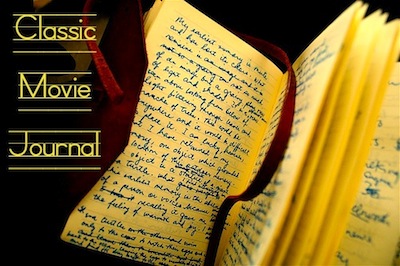 By Jennifer Baldwin. Quick, name five Jane Greer movies!
By Jennifer Baldwin. Quick, name five Jane Greer movies!
1.) Out of the Past
2.) The Big Steal
And… ???
Okay, I’ll play:
3.) The Company She Keeps
4.) Man of a Thousand Faces
And, in a small role…
5.) 1973’s The Outfit. More on that last one in a bit.
(Also, her stint on Twin Peaks was nothing to sneeze at and kinda noirish in that weird, Lynchian way.)
She might not have made many memorable movies, but all it took for Jane Greer to become the queen of film noir was one role: Kathie Moffat in Jacques Tourner’s film noir masterpiece, Out of the Past.
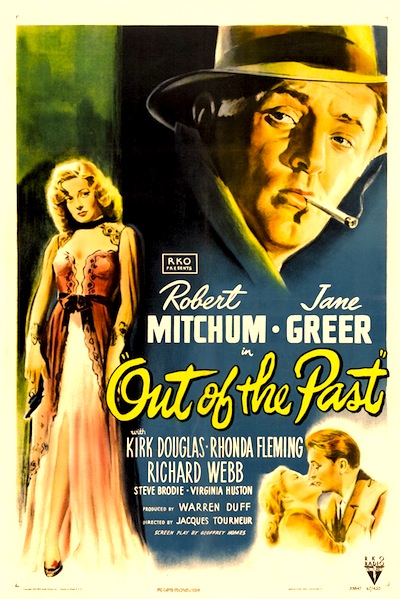 Yes, Stanwyck was the ultimate spider woman as Phyllis Dietrichson in Double Indemnity, and made more half-baked films noir than Greer made films total. And yes, Gloria Grahame was the epitome of B-girl badness in films like The Big Heat and Human Desire. And, of course, glamourpusses like Ava Gardner and Rita Hayworth both had signature roles in the dark den of Noir City.
Yes, Stanwyck was the ultimate spider woman as Phyllis Dietrichson in Double Indemnity, and made more half-baked films noir than Greer made films total. And yes, Gloria Grahame was the epitome of B-girl badness in films like The Big Heat and Human Desire. And, of course, glamourpusses like Ava Gardner and Rita Hayworth both had signature roles in the dark den of Noir City.
But for me, Greer is the queen of noir because she was every dark dame wrapped into one. She was wicked temptress, misunderstood moll, glamour puss with a kiss of death, and also something even more off-kilter and sinister than her fellow femmes. Out of the Past‘s Kathie Moffat might just be more fatal than all of them because she isn’t just evil, she’s vulnerable too and that vulnerability – that quizzical beauty in her face, and pleading in her eyes – make her evil actions all the more horrible. We can tell that Stanwyck’s Phyllis – from the moment her anklet slithers across the screen – is definitely up to no good. We can tell she’s pure evil, even as Stanwyck imbues her with some small measure of humanity at the end. But Greer’s Kathie could have been good and that’s why she’s all the more terrifying. We want her to be good even as she lies, steals, and kills.
It’s the type of performance for which the word “enigma” was invented. The intoxicating allure of Kathie Moffat is summed up when she pleadingly tells Robert Mitchum that she’s not a thief. His response: “Baby, I don’t care.” She could be good, she could be bad, but in the end it doesn’t matter: she’s irresistible. And that is what makes la femme so fatal.
Greer’s teenage bout with Bell’s palsy is part of the mystique. It left half of her face paralyzed and it was only through tireless muscle exercises that she was able to recover movement in her face. But it also left Greer with a permanent, slightly lopsided smile. This lilt in her lips gives her face a certain mystery, as if we’re never quite sure what she’s thinking.
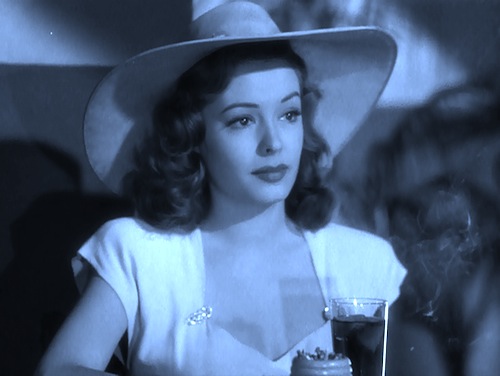
One of the best places to find out what the real Jane Greer was thinking is Eddie Muller’s delicious book, Dark City Dames: The Wicked Women of Film Noir. It compiles Muller’s interviews with Greer, as well as noirish dames Audrey Totter, Marie Windsor, Evelyn Keyes, Ann Savage, and Coleen Gray. If you are a fan of film noir, this book is a must-read. For one thing, we learn that Jane Greer was married to Rudy Vallee (a man twice her age!) when she was in her early twenties, and that he was a fetishistic creep with a bad porn habit who made Greer dye her hair an unflattering raven-black to suit his own predilections.
Greer was pursued by no less than Howard Hughes himself, but she ultimately rejected him and he in turn pretty much stalled her career at RKO just as she was coming off that career-making performance in Out of the Past.
So we can thank Howard Hughes and his wounded, paranoid heart for hampering the career of Jane Greer, queen of noir.
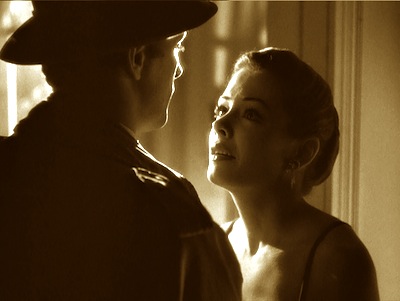
But even though she never made another film noir as brilliant as Out of the Past, she never completely abandoned the dark streets of the crime drama. Enter The Outfit, a 1970s second-wave color noir that has enough cameos of old stars and character actors to make any classic movie fan point and cheer: Robert Ryan, Elisha Cook Jr., Marie Windsor, Timothy Carey, and of course … Jane Greer.
It’s a small part, but she still captivates. In fact, all of the old timers captivate, whether it’s the brief appearance of world weary Marie Windsor, pouring drinks behind a bar; or Elisha Cook, Jr. getting bossed around by the heavies (as usual); or Robert Ryan and Timothy Carey playing poker and planning hits.
The film stars Robert Duvall and Joe Don Baker as two gunmen who go after a powerful crime syndicate for money and revenge. It’s combination heist flick, revenge story, and gritty crime noir. Written and directed by the underrated John Flynn, and based on a story by Donald Westlake, The Outfit is a solid example of the violent second-wave noir of the 1970s. It’s bloodier than an old school noir, and even more amoral. Duvall’s criminal, Earl Macklin, is not a good man. He’s not even a “misunderstood” criminal. He’s a bad guy who kills with ruthless ease. Even his cause – revenge for the murder of his brother – is tainted by the fact that his brother was murdered precisely because he and Duvall robbed a syndicate bank.
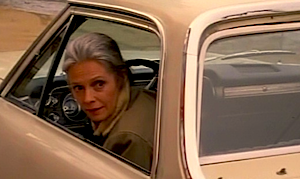
Jane Greer plays Alma, the widow of the murdered brother, and for a change of pace she’s not a femme fatale or a dangerous woman. She’s simply a woman beaten down by the despair and death of the criminal world. There’s a certain tiredness to Alma’s character, and to Greer’s performance, that puts the lie to all of that noir cool we usually see in these types of films. Yeah, okay, Duvall and Baker embody charismatic criminal cool as they attempt to take down the Outfit. But that earlier scene with Alma is still hanging around the edges, reminding us that it all ends up tired and empty in the end. And who better to deliver that message than the former Kathie Moffat?
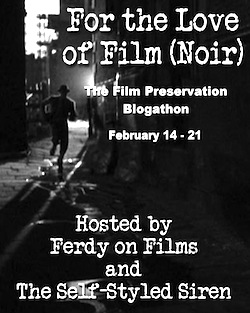 The Outfit is now newly remastered and available on DVD through the Warner Archive Vault Collection.
The Outfit is now newly remastered and available on DVD through the Warner Archive Vault Collection.
Speaking of Noir, there’s a fundraising blogathon coming up in February called “For the Love of Film (Noir)” — a sequel to last year’s hugely successful silent film preservation fundraiser, “For the Love of Film,” sponsored by Marilyn Ferdinand of Ferdy on Films and Farran Smith Nehme of Self-Styled Siren. Ferdinand and Nehme are at it again, this time with a blogathon running from February 14 to 21, focusing on film noir and benefiting the Film Noir Foundation.
I’ll be contributing a couple of posts, both here at Libertas and at my own blog, and I would encourage everyone who loves movies and film noir to contribute what they can to the fundraiser. The last time, “For the Love of Film” raised $30,000 for the National Film Preservation Foundation, and that money went towards the preservation of two early short films. Hopefully we can equal or surpass that amount this time. As I’ve written before, film preservation is a naturally conservative cause, so mark your calendars for February 14 and check out “For the Love of Film (Noir).”
Posted on January 27th, 2011 at 10:30am.
Jennifer – I was remiss in not thanking your for your support of For the Love of Film last year, so let me thank you doubly for drawing attention to our cause among conservatives, who, of course, have an equal stake with all Americans – indeed, all people – in preserving our cultural heritage. I’m incredibly encouraged and grateful for esteem in which you hold classic cinema and am very eagerly looking forward to reading your contributions to the blogathon. Please be sure to send your links in so they can go on our blogathon home pages.
Marilyn, thanks so much for writing in. It’s a pleasure to have you join us and we’ll do everything we can to support the cause – in which we are ardent believers.
Marilyn, thank you for your generous comment. When it comes to supporting For the Love of Film, the pleasure is all mine! 🙂 What you and Farran have done with these blogathons is nothing short of amazing. Thank you for giving me, and all film lovers, a chance to be part of something so important.
When the 14th rolls around, I’ll send my links your way!
Excellent piece. I truly believe Hollywood is incapable of reviving film noir as a genre. Moral relativity has killed it. If there is no truth, or multiple truths, then why face femme fatales, dangerous hitmen, and powerful crime lords to find it? The protagonist’s willingness to confront amoral antagonists was what made film noir great.
Great comment, blackhawk! I’ve always thought, despite its cynical outer shell and propensity for anti-heroes, that film noir is a highly moralistic genre (or style, depending on one’s definition of these terms).
How many poor saps in a film noir have had their lives ruined or almost ruined thanks to making one bad decision? This is the template for dozens of noir movies.
Fall for a dame you shouldn’t have? Bam! She ends up shooting you. Decide to innocently steal a couple hundred bucks to pay for your wife’s hospital room (cause she’s about to have a baby)? Bam! You end up wanted by the gangsters you stole from and the cops are after you for a murder you didn’t commit. Without a strict moral code as its underpinning, film noir doesn’t really work.
I agree that film noir deals with morality, and has a deep pessimism is at its core. But not are all antiheroes really confront amoral antagonists. In fact, a somewhat unusual noir called Murder By Contract puts a contract killer in the noir antihero role – his inability to kill a woman is his Waterloo. Nonetheless, I rather think Hollywood’s turn to bogeymen as the source of evil gives ordinary people permission to downplay their own failings. In that sense, Blackhawk, I agree with you completely.
For what it’s worth, I think that film noir is the quintessentially interior, psychological genre – which is basically why the current Hollywood system has such a hard time with it. The industry’s shallowness of late makes it difficult to really exploit the genre’s potential.
Excellent point, Jason.
Marilyn, Murder By Contract sounds like a good one, I will have to check it out!
For me, I always tend to look at film noir as a spiritual genre. The very souls of the characters are at stake, though it’s often symbolized in physical terms (death, imprisonment, exile). What makes many of these movies so bleak is the almost Calvinistic way that some characters seem to be “doomed” no matter what they do.